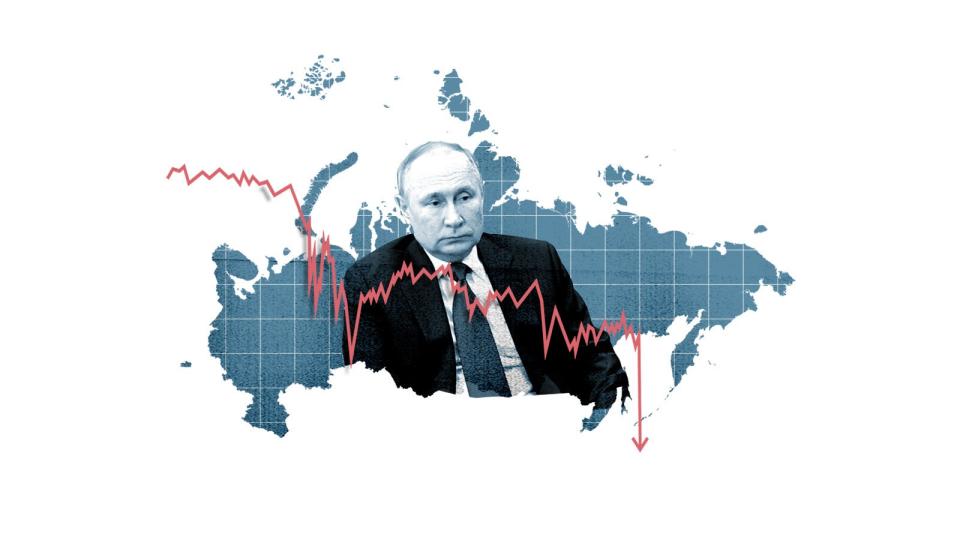To take a yacht or not? Why it may not be legal to seize Russian oligarchs' property.
- Oops!Something went wrong.Please try again later.
One of the most celebrated moments of President Joe Biden's State of the Union address came when he spoke directly to Russian oligarchs: “We are joining with our European allies to find and seize your yachts, your luxury apartments, your private jets. We are coming for your ill-begotten gains.”
The Russian oligarch has become a universally despised embodiment of the Putin regime after the Ukrainian invasion. Not surprisingly, the seizure of obscenely opulent yachts – like the 213-foot yacht owned by Alexei Mordashov in Italy and Igor Sechin’s 280-foot yacht in France – has been praised as a victory in defense of democracy. Resorts, planes and other property also have been seized. (Putin moved his yacht, Graceful, out to sea before the invasion, according to Insider)
Seizing property owned by the super wealthy is always good politics. Biden's line was strikingly similar to the warning of Sen. Elizabeth Warren, D-Mass., to wealthy Americans in the 2020 presidential campaign that she was coming after "your Rembrandts, your stock portfolio, your diamonds and your yachts.” Warren's pledge rested on highly dubious constitutional assumptions but was repeated by other Democratic candidates.
We should question unlawful seizures

In contrast, questioning the legal basis for seizing the boats and baubles of the super wealthy is hardly popular. The "oligarch" is a term without any redeeming or positive connotations. It has joined the seal clubber and the hazmat dumper as categorically despised identities.
There is an obvious class warfare element to these anti-war measures. A German leader, for example, called for yachts to be given to nongovernmental organizations to shuttle migrants from Africa and Asia to Europe.
Changing family, changing America: It's not your (grand)parents' 'Cheaper by the Dozen'
Indeed, some on the left balk at limiting seizures to Russian billionaires. As an Australian writer noted, "If expropriating the super yachts and other overseas assets of Russian oligarchs … sounds reasonable, there is an even more reasonable case to expropriate the wealth gains of the world’s 10 richest men and use it for social good."
It's actually a fair point, because there may be no more legal justification to seize a Russian billionaire's property than Jeff Bezos' mega-yacht.
For the record, I am not and have never been a member of the oligarch class. Nor do I hold any sympathy for these figures who acquired their billions from close association with Vladimir Putin or because of their special status in Russia.
What happens after Russian war?
The problem is that our leaders may be overselling the legal justification for these seizures. Serious legal questions surround the seizures of boats, planes and other property owned by oligarchs. In these largely uncharted waters, many of the owners are likely to get back their yachts and other property after the headlines have receded.
Shlomo Kramer: Russia and Ukraine are only the beginning of modern warfare being waged online
The United States and Western countries have considerable authority to seize property, but less authority to keep it. The reason is that, unlike Russia, these countries are bound by property rights and rules of due process.
The authority for such seizures is fairly consistent and straightforward. The United States and other countries are alleging that the property may constitute a form of money laundering or ill-gotten gains. Under U.S. civil forfeiture laws, the Justice Department only requires a warrant to seize an asset allegedly used to commit a crime or that represents the "proceeds of illegal activity.”
The hard part is to keep it.
The oligarchs are fantastically wealthy with massive companies, sports teams and other assets. While they often acquired such wealth through insider deals and special status in countries like Russia or China, they run businesses that generate billions in revenue through public transactions.
CRT: Trump said lay down your life to stop critical race theory. But what about…Oxford commas?
Prosecutors must show that the property is being used to commit a crime or was purchased from ill-gotten gains, but the oligarchs will try to show revenue sources from established businesses.
In other words, prosecutors would have to show that large corporations that have operated for decades in international markets are now deemed criminal enterprises for the purposes of these properties. It is not clear that governments now seizing the property will be able to establish the nexus between an alleged crime and these proceeds or property for some, if not most, of the oligarchs.

Clearly, the isolation of oligarchs serves to put pressure on Putin and potentially create wedges between him and his most powerful allies. One oligarch, Leonid Nevzlin, has renounced his citizenship while denouncing the invasion. He has insisted that “I was one of the first to be hit by Putin. He threw my friends in jails, and killed some of them."
Another oligarch, Roman Abramovich, announced that he would sell the Chelsea soccer team and donate the proceeds to the victims of the Ukraine war. It didn't help. He was added to the sanctions list for seizures.
Alexandra Vacroux: Will Putin turn the war in Ukraine into a nuclear crisis? We can't rule it out.
There are other complications. Oligarchs are pulling funds from a wide array of accounts and companies with different streams of revenue. Their yachts often are in the names of separate legal entities as opposed to their personal property. Take the Dilbar, the 512-foot monstrosity of Alisher Usmanov seized in Germany. It is reportedly registered in the Cayman Islands under a company in Malta.
Yachts for Ukraine Act
These issues could soon be before U.S. courts. Members of Congress are clamoring to sign on to the Yachts for Ukraine Act. The name alone is enough to produce a drooling Pavlovian response from most politicians. It would allow the seizure of any property held by Russian elites in America that is valued above $5 million and allow the government to sell the seized assets and use the cash to aid Ukraine.
One bill even allows for the issuing of "letters of marque" to allow citizens to engage in privateering to seize yachts themselves like Sir Francis Drake. The United States used such letters in the Revolutionary War and the War of 1812.
The Yachts for Ukraine Act shows the casual crafting of proposed laws. The act covers persons who meet two criteria. First, they must have "the wealth of which, according to credible information, is derived in part through corruption linked to or political support for the regime of the President of the Russian Federation, Vladimir Putin."
What constitutes credible information, corruption or political support is simply left to the imagination of regulators. Under that standard (sans the Putin link), most global billionaires could be targeted, given their often close association and support of ruling governments.
The second criteria is even more intractable: The person must be linked to sanctions imposed by the president "relating to corruption, human rights violations, the malign influence of the Russian Federation, or conflicts in Ukraine."
Again, what must the nexus be for a connection to constitute malign influence or corruption?
The greatest irony might be yet to come. When a country seizes these vessels, they create a bailment, or responsibility, for the property. Yachts are notorious for requiring high levels of care and maintenance from full-time crews. If they deteriorate in government possession, the oligarchs could demand damages, requiring countries to pay for repairs before they set sail for their next golden sunset.
None of this means that we should not target companies and oligarchs who are directly supporting this unprovoked and unlawful war. However, we do not fight lawlessness in Russia by dispensing with the rule of law in our own country.
There are meaningful actions that Congress can still take to pressure Putin. We cannot be distracted by the shining objects of American politics. The Ukrainians are facing immediate destruction and need meaningful action.
Jonathan Turley is the Shapiro Professor of Public Interest Law at George Washington University and a member of USA TODAY’s Board of Contributors. Follow him on Twitter: @JonathanTurley
You can read diverse opinions from our Board of Contributors and other writers on the Opinion front page, on Twitter @usatodayopinion and in our daily Opinion newsletter. To respond to a column, submit a comment to letters@usatoday.com.
This article originally appeared on USA TODAY: Seizing oligarchs' yachts is popular. But it may not be legal.

